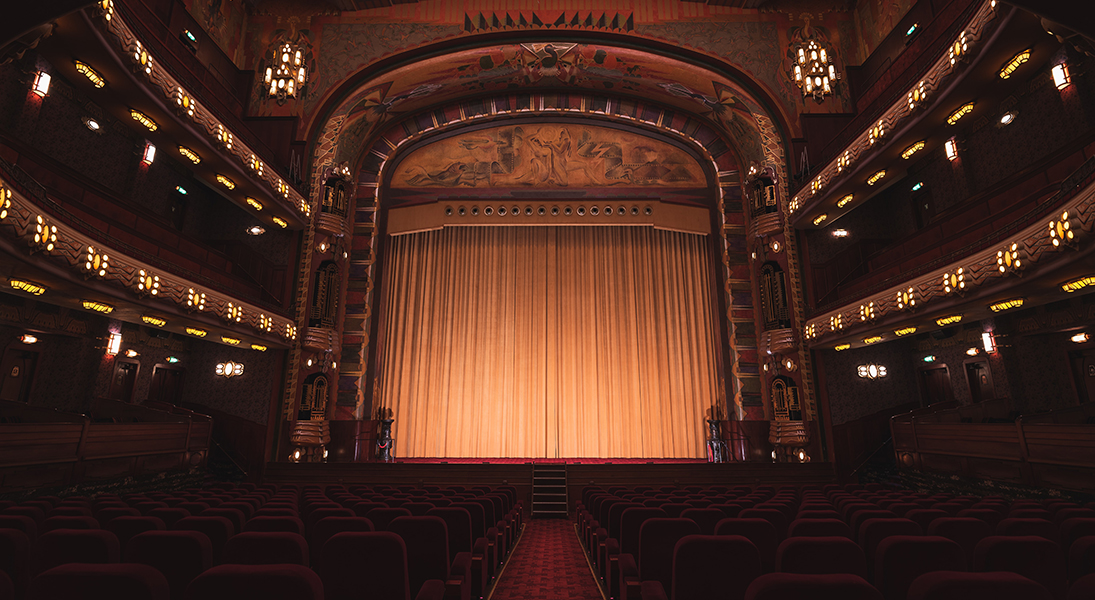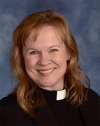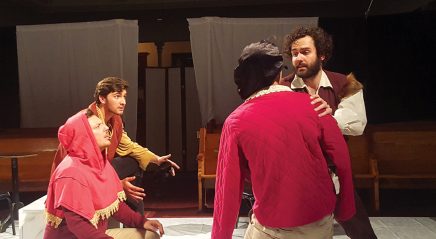In one of my oldest memories, my little hand is held firmly in my mother’s as we climb a long, wide staircase. We are dressed in our finest shoes and dresses, matching the elegance of the great chandeliers, plush carpeting and curved balconies. The air is pregnant with excitement and, when the lights grow dim, magic is near.
This memory is really a compilation of days—together at Los Angeles’ Dorothy Chandler Pavilion, Ahmanson Theatre, Mark Taper Forum or Pantages Theatre, or even a college theater. I was fortunate to be raised near a big city with wonderful theaters and even more fortunate to be raised by parents who were patrons of the arts. My mother was a former dancer and an admirer of all things theatrical. My father played in his high school band and lifted up the beauty and brilliance of music.
Times were often hard and money was usually tight in my childhood home, yet somehow one of my parents would periodically scrape together money for theater tickets, and I was transported to another world. For those two or three hours, we would forget that the gas bill was overdue, the air-conditioning was broken again and the dinner awaiting us was meat from a can. Life was beautiful at the theater, and we were so happy.
I was not raised religiously. My mother had been badly wounded by a toxic church, so she decided to keep me from the institution entirely. Through my exposure to theater, though, I received not only messages of beauty and happiness but spiritual messages I probably wouldn’t have gotten in any other way.
Man of La Mancha taught me to “dream the impossible dream.” Les Misérables showed me that “to love another person is to see the face of God.” Cats instilled in me the sacredness of beholding our past, to “let the memory live again.” West Side Story made me excited for the future because “something’s coming—I don’t know what it is, but it is gonna be great!” Though my mom was suspicious of religion, she did allow me to see Jesus Christ Superstar, which is how I met Jesus for the first time.
Theater was my church, the only one I was allowed, where I heard sermons about love, goodness, human resilience and divine mercy. I left each show not just temporarily entertained but permanently wiser.
Even more, theater was my cathedral—a portal to the sacred.
Theater was my church, the only one I was allowed.
The song lyrics taught me rational messages of love and grace, but there was more. Everything I heard and saw was designed to speak another language—of spiritual and emotional elation. Music opens the heart; makeup, costumes, lighting and sets help us feel. Theater’s vocabulary is not simply left-brain analysis but also right-brain meaning and depth. Theatergoers should do more than learn from theater; they should feel.
I did feel, every time, and in my heart’s swelling, I understood things I hadn’t learned from school, at home or in any other part of the culture. I inhabited the land of the soul. I was entrusted with the “something” that makes life meaningful. I dwelled, for a time, in the kingdom.
From the time I could walk, I happily performed in front my family’s fireplace, on top of coffee tables and on stages in restaurants. I acted in plays and musicals in elementary school, high school and college. I also worked behind the scenes in set design, makeup, props, lighting, directing and producing. Used to being on stage, I made a smooth transition to teaching at a podium—and, later, preaching in a pulpit.
As a pastor, I encourage people to see the invisible, hear the inaudible and encounter the sacred themselves. I encourage my parishioners to look beyond their five bodily senses to their spiritual ones: intuition and wonder. I don’t want them to listen to my sermons as if they were in a classroom; I want them to open their hearts, let the music lift them, gaze at the flickering candles until they perceive more in and around them, and sense the scales fall from their eyes.
In worship, as in theater, we utilize what the mind and body can see and hear, but we do so for the purposes of knowing and feeling beyond all that. The greasepaint and footlights of theater and the paraments and symbols of church are only passageways. The human spirit will recognize the mystical as we give ourselves over to the new language of intuition and wonder.
I encourage all Lutherans—especially cerebral ones—to enjoy the wonderful theology our tradition offers but to understand that theology is only, as the Zen teaching says, a finger pointing at the moon, not the moon itself. Martin Luther suggested that we pursue, and celebrate, a direct encounter with the living God. Nonrational expressions such as music, art and dance can aid us in doing so.
If you can’t sense this swelling of the heart, this awakening of the spirit, this knowing beyond the knowable when you’re in church on Sunday morning, add a theater experience to your routine now and then. When you feel your spirit come alive in front of the stage, remember that feeling, and when you return to worship, let that feeling beckon you. This beauty, peace, joy and wonder is your birthright—a gift from our most holy God.








